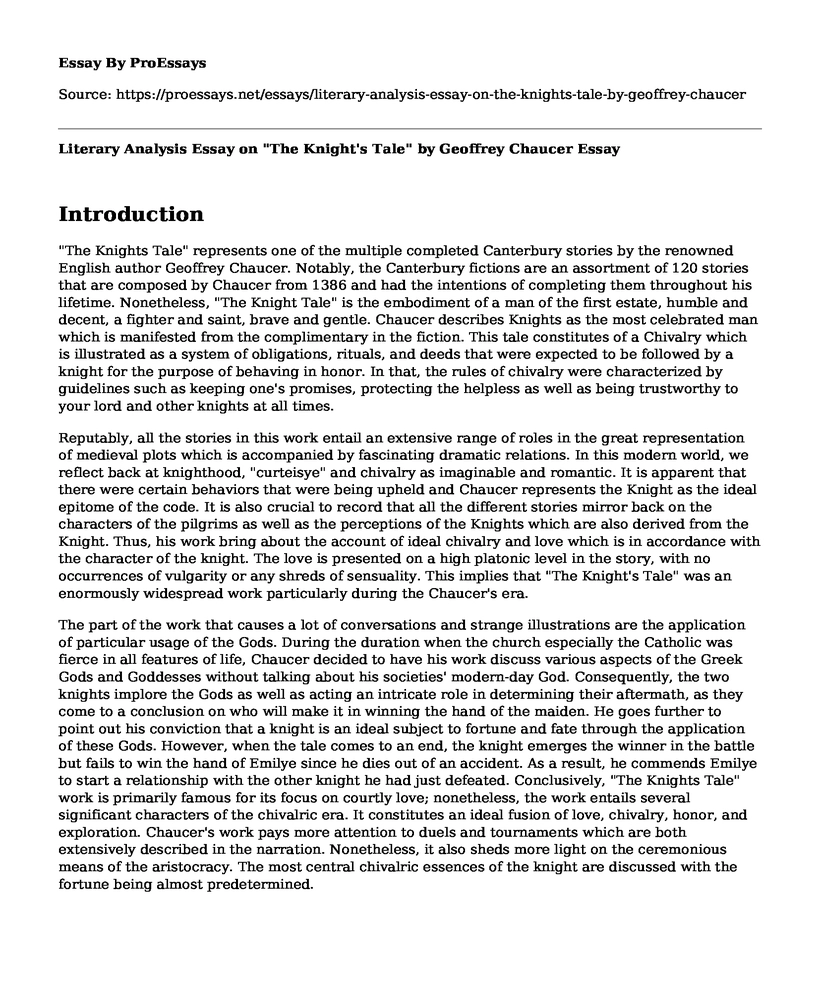Introduction
"The Knights Tale" represents one of the multiple completed Canterbury stories by the renowned English author Geoffrey Chaucer. Notably, the Canterbury fictions are an assortment of 120 stories that are composed by Chaucer from 1386 and had the intentions of completing them throughout his lifetime. Nonetheless, "The Knight Tale" is the embodiment of a man of the first estate, humble and decent, a fighter and saint, brave and gentle. Chaucer describes Knights as the most celebrated man which is manifested from the complimentary in the fiction. This tale constitutes of a Chivalry which is illustrated as a system of obligations, rituals, and deeds that were expected to be followed by a knight for the purpose of behaving in honor. In that, the rules of chivalry were characterized by guidelines such as keeping one's promises, protecting the helpless as well as being trustworthy to your lord and other knights at all times.
Reputably, all the stories in this work entail an extensive range of roles in the great representation of medieval plots which is accompanied by fascinating dramatic relations. In this modern world, we reflect back at knighthood, "curteisye" and chivalry as imaginable and romantic. It is apparent that there were certain behaviors that were being upheld and Chaucer represents the Knight as the ideal epitome of the code. It is also crucial to record that all the different stories mirror back on the characters of the pilgrims as well as the perceptions of the Knights which are also derived from the Knight. Thus, his work bring about the account of ideal chivalry and love which is in accordance with the character of the knight. The love is presented on a high platonic level in the story, with no occurrences of vulgarity or any shreds of sensuality. This implies that "The Knight's Tale" was an enormously widespread work particularly during the Chaucer's era.
The part of the work that causes a lot of conversations and strange illustrations are the application of particular usage of the Gods. During the duration when the church especially the Catholic was fierce in all features of life, Chaucer decided to have his work discuss various aspects of the Greek Gods and Goddesses without talking about his societies' modern-day God. Consequently, the two knights implore the Gods as well as acting an intricate role in determining their aftermath, as they come to a conclusion on who will make it in winning the hand of the maiden. He goes further to point out his conviction that a knight is an ideal subject to fortune and fate through the application of these Gods. However, when the tale comes to an end, the knight emerges the winner in the battle but fails to win the hand of Emilye since he dies out of an accident. As a result, he commends Emilye to start a relationship with the other knight he had just defeated. Conclusively, "The Knights Tale" work is primarily famous for its focus on courtly love; nonetheless, the work entails several significant characters of the chivalric era. It constitutes an ideal fusion of love, chivalry, honor, and exploration. Chaucer's work pays more attention to duels and tournaments which are both extensively described in the narration. Nonetheless, it also sheds more light on the ceremonious means of the aristocracy. The most central chivalric essences of the knight are discussed with the fortune being almost predetermined.
Conclusion
As depicted in this work, there is notable highlighting on honor and proper demeanor in the entire story along with ritual, form and above all the code of behavior. Therefore, "The Knight's Tale" is represented as a tragic of heritage, nobility and paying more attention to astrology and mythology.
Cite this page
Literary Analysis Essay on "The Knight's Tale" by Geoffrey Chaucer. (2022, May 17). Retrieved from https://proessays.net/essays/literary-analysis-essay-on-the-knights-tale-by-geoffrey-chaucer
If you are the original author of this essay and no longer wish to have it published on the ProEssays website, please click below to request its removal:
- Essay Sample - Invisible Man: Deception
- Essay on Writing: A Skill to Be Learned or an Innate Talent?
- Literary Analysis Essay on Connection Between Gender and Class in Respectable Woman by Kate Chopin
- Research Paper on Medea Mythology
- Critical Essay on Gender Equality in Brave New World
- Essay Sample on A Rose for Emily: Exploring William Faulkner's Miss Emily, Language, and Themes
- Uncle Tom's Cabin: African American Representation in 19th Century - Essay Sample







